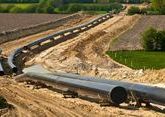The construction of the North-South Road Corridor in Armenia seems to be on the verge of collapse. According to the Armenian press, the government suspects that international organizations no longer intend to lend to the project. In September 2009, Armenia and the Asian Development Bank signed a loan agreement, according to which, the construction of the road corridor should be completed by 2016. However, construction work has been started only three years after the signing of the agreement. As a result, only a small part of the road corridor has been built since 2012, and the cost of the project has been constantly increased or overestimated. If in September 2012 the project was estimated at $1 billion, today, according to the minister, it is estimated at $2 billion. Now the authorities are trying to find investors to complete the project. Transport Minister Vahan Martirosyan said that they need $1.5 billion to build the Artashat-Meghri section (about 350 km).
Experts say that the read corridor's relevance has already been called into question, and in a couple of years this road will lose its meaning altogether due to its inability to compete with the already operating transport network involving Azerbaijan.
On October 30, the Baku-Tbilisi-Kars railway has been officially opened, speaking of which, its construction caused a lot of problems as well - both financial and technical, but they were resolved. Yesterday, Azerbaijani President Ilham Aliyev told how it was done: "What was the financial source? The State Oil Fund. And where the State Oil Fund's money come from? From hard work of oil workers. If Baku-Tbilisi-Ceyhan, Baku-Tbilisi-Erzurum were not built, if this corridor were not opened, if we had no means, how could we build a road? Immediately after my election as a president I started to deal with this project. I saw that there are great difficulties. First of all, financial difficulties and solving of technical issues, since it was necessary to reach agreements."

"If we did not have financial resources, how could we build Baku-Tbilisi-Kars? Because a significant part of this road - 504 kilometers - passes through the territory of Azerbaijan.There is more than 200-kilometer section on the territory of Georgia, financial and technical issues are also solved by Azerbaijan there. The length of the road is about 850 kilometers. That is, we were able to achieve this only as a result of effective activity, at the expense of the funds kept in a transparent Oil Fund," Aliyev said.
Yerevan does not have money for such project, for obvious reasons. Recently, a partial citizen of Armenia wrote in Facebook that Yerevan should blame only itself for the expected failure of the project of the Armenian route of the North-South Road Corridor, and not its neighbors, which are more successful in terms of doing business. Friends of the user joined in a lively discussion about what exactly prevents Armenia from developing its economy, and why Baku succeed in implementing infrastructure projects, and Yerevan does not. Vestnik Kavkaza cites several fragments of the discussion as saying:
"Why blame the neighbors for understanding their national interests and implementing infrastructure projects. Why play the victim that was left without the Baku-Tbilisi-Kars railway, if we ourselves are neither able to build a railroad nor the North-South road corridor. And in 10 years, we'll sit and complain ... ";
"International investors do not want to invest in projects without additional guarantees, as it was in the case of the BTK";
"The analogy with BTK was quite appropriate. It's just that Baku was able to implement the project, but we ... I do not know ";
"With a strong desire, you can do anything, and there is no need for oil. You need to use your head and love your homeland ";
"Nobody wants to invest in the conflict region. Nobody wants to put their additions at risk without guarantees of peace. "

It's hard not to agree with the Armenian Facebook users. Experts have long said that the projects being implemented can turn Azerbaijan and Georgia into a regional hub between Asia, Central Asia and Europe. However, Armenia remains outside these projects for one reason only - because of the ongoing conflict over Nagorno-Karabakh. Refusing to admit it, the Armenian authorities continue its policy of maintaining the status quo in the issue of Nagorno-Karabakh, which leads to a dangerous isolation of the country.
Instead of trying to get out of this isolation, Yerevan had relied on ... the failure of the Baku-Tbilisi-Kars project - they either justified the economic inexpediency of the BTK project, or hoped that Georgia or Iran would not show proper interest in the project. However, it seems that today Tehran and Tbilisi, in view of economic expediency, prefer to deal with Baku, and Yerevan fell outside regional integration and, if its occupation policy is to be continued, the situation will only worsen.










